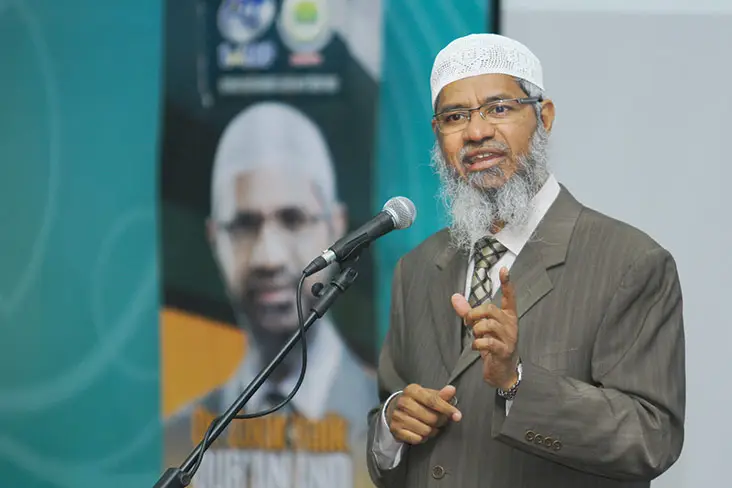
Zakir Naik, born on October 18, 1965, in Mumbai, is a figure who sparks heated debates worldwide. Initially a practising doctor, he later transformed into one of the most divisive Islamic preachers, admired by some and condemned by others. While he’s seen as a spiritual guide by many, his words have led to both adoration and heavy criticism. Today, his name trends frequently on platforms like X (formerly Twitter), especially for his controversial relationship with India.
From Doctor to Preacher
Though Zakir Naik started his career as a doctor, earning an MBBS degree, his deep interest in Islamic studies led him down a different path by the late 1980s. He founded the Islamic Research Foundation (IRF) and quickly became a prominent figure in religious circles. Through his lectures, he built a reputation as a preacher who often compared various religions, positioning himself as an advocate for Islamic teachings.
The Birth of Peace TV
In 2006, Naik launched Peace TV, an Islamic television channel that quickly gained international attention. Broadcast in English, his lectures on comparative religion reached millions of viewers worldwide. His ability to blend theological discussions with modern issues made him a popular, yet polarizing figure. For his followers, he was a voice of clarity in a complex world, but for his critics, he often crossed the line into dangerous rhetoric.
Fame Brings Controversy
With success came controversy. Naik has been accused of promoting extremism, and some of his comments have been interpreted as justifying acts of terrorism. His remarks, particularly those perceived as anti-Hindu and anti-Christian, stirred widespread backlash, especially in India. Naik’s controversial stance on several sensitive issues, along with allegations of links to terror groups like Al-Qaeda and ISIS, intensified the criticisms against him. Additionally, accusations of Money laundering further complicated his reputation, leading to legal action.
Global Bans and Legal Issues
Over the years, Naik’s inflammatory speeches caught the attention of governments worldwide. In 2012, India banned Peace TV, citing its spread of hate speech. By 2017, Naik fled India for Malaysia, where he was granted permanent residency. The US added him to its watchlist in 2016, and by 2019, Interpol issued a Red Notice against him. Countries like the US, UK, and Canada have also banned him from entering.
A Divisive Legacy
Despite his legal troubles, Naik continues to enjoy a loyal following among certain Muslim communities. His teachings remain accessible online, and he frequently addresses his audience through digital platforms. While his supporters see him as a preacher spreading the true message of Islam, his critics argue that his divisive rhetoric does more harm than good, fuelling religious intolerance. His presence continues to fuel debates on issues like religious freedom, extremism, and the role of media in shaping public perception.
Speculation and Rumours:
In the digital age, the online world is quick to judge. Since the controversies surrounding Zakir Naik, the internet has been filled with speculation. Some believe he’s a victim of a larger political conspiracy, while others are convinced that his extreme views justify the backlash. Reddit discussions and X threads dissect every statement, as audiences scramble to form opinions. However, the truth remains—what happens behind closed doors is far more complex than what’s seen online.
What’s Next for Zakir Naik?
Zakir Naik’s future remains uncertain. As legal issues continue to mount, his influence may dwindle further. However, he still holds sway among those who admire his interpretations of religion. Whether he fades into the background or manages to re-establish himself on a global stage, his journey is a reminder that the line between religious freedom and extremism is often blurry. As long as his name sparks conversation, Naik will remain a figure of intrigue and controversy.
Also read, Baba Siddique: Charitable Heart of a Controversial Political Icon